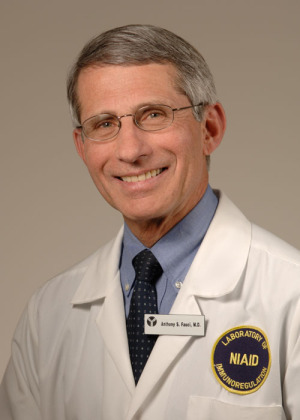by
Barbara Kram, Editor | April 23, 2007
Immunologist and AIDS researcher Anthony S. Fauci, M.D., director of the National Institute of Allergy and Infectious Diseases (NIAID) of the National Institutes of Health (NIH), has been awarded the 2007 George M. Kober Medal of the Association of American Physicians (AAP) for his outstanding contributions to academic medicine.
The Kober Medal is among the highest honors conferred upon physician-scientists in the United States. Dr. Fauci, a longtime AAP member and former AAP president, will be presented with the medal on April 15, 2007 at the joint meeting of The American Society for Clinical Investigation and the AAP in Chicago.
"Tony Fauci is the consummate physician-scientist leader," says NIH Director Elias A. Zerhouni, M.D. "His contributions to medicine, public health and science are profound."



Ad Statistics
Times Displayed: 78988
Times Visited: 2797 Ampronix, a Top Master Distributor for Sony Medical, provides Sales, Service & Exchanges for Sony Surgical Displays, Printers, & More. Rely on Us for Expert Support Tailored to Your Needs. Email info@ampronix.com or Call 949-273-8000 for Premier Pricing.
"Dr. Fauci is a superb clinician who has made signal contributions to the fields of immunoregulation, rheumatology and HIV/AIDS," says John I. Gallin, M.D., an AAP member and director of the NIH Clinical Center, who will present the medal to Dr. Fauci. "In addition, he has been a mentor and friend to a legion of younger investigators, many of whom have become top physician-scientists in their own right. Dr. Fauci also has been a leading scientific spokesman who has cogently informed the public about numerous public health challenges including HIV/AIDS, SARS, bioterrorism, and the threat of pandemic influenza."
The Kober Medal is named after George M. Kober, M.D., a pioneer in public health reform in the late 19th century and the early 20th century. It recognizes physicians acknowledged as leaders in internal medicine. The AAP (
http://www.aap-online.org) is a nonprofit professional organization founded in 1885 by seven physicians, including the renowned William Osler, for "the advancement of scientific and practical medicine." The association has about 1,000 active members and approximately 550 emeritus and honorary members from the United States, Canada and other countries.
Dr. Fauci"s tenure as NIAID director began in 1984. He oversees an extensive research portfolio of basic and applied research to prevent, diagnose and treat infectious and immunologic diseases. He also serves as one of the key advisors to the White House and the Department of Health and Human Services on global HIV/AIDS issues, and on initiatives to bolster medical and public health preparedness against emerging infectious disease threats such as pandemic influenza.
Dr. Fauci received his M.D. from Cornell University Medical College and then completed an internship and residency at The New York Hospital-Cornell Medical Center. He came to NIH in 1968 as a clinical associate in the NIAID Laboratory of Clinical Investigation. In 1974, he became head of the lab"s Clinical Physiology Section, and in 1980 was appointed chief of the Laboratory of Immunoregulation (
http://www3.niaid.nih.gov/labs/aboutlabs/lir/default.htm), a position he still holds.

